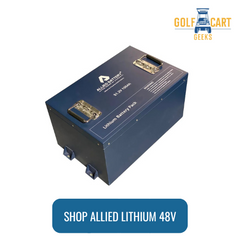
Golf carts have gained popularity as a mode of transportation for short distances, particularly in golf courses and retirement communities. The battery of a golf cart is an essential component since it is responsible for powering the vehicle.
All golf cart batteries are not created equal. Several battery types, such as lead-acid, lithium-ion, and gel batteries, are available in the market. This guide provides comprehensive information about golf cart batteries, helping you decide when purchasing a new battery.
What Are Golf Cart Batteries?
Golf cart batteries are rechargeable power sources that provide electricity to run electric golf carts. The batteries typically comprise lead-acid cells that generate power through chemical reactions. These batteries are the most common type used in golf carts and are affordable and readily available in the market.
The batteries used in golf carts are generally deep-cycle batteries, which means they are designed to discharge power over a longer period than traditional car batteries. This type of battery is ideal for golf carts because the vehicle requires constant power to move around the course. In addition, a deep cycle battery has thicker plates and is built to withstand multiple discharge and recharge cycles.
The capacity of the battery, which is measured in amp-hours (Ah), is a crucial aspect to consider when purchasing a golf cart battery. The capacity determines how long the battery will last on a single charge. For example, a 200 Ah battery can provide 200 amps of current for one hour or 100 amps for two hours.
Types of Golf Cart Batteries
Golf cart batteries come in different types, each with advantages and disadvantages. Below, we will explore the following types of golf cart batteries:
Flooded Lead Acid
Flooded lead-acid (wet) batteries are the most common type of golf cart batteries. These batteries are affordable and readily available but require regular maintenance to ensure optimal performance.
Flooded lead-acid batteries have removable caps that allow distilled water to be added to the cells as needed. They are also susceptible to spills and leaks, which can damage the battery and surrounding components of the golf cart if not handled properly.
Advantages

Low cost compared to other batteries

Robust and can withstand harsh conditions

High energy density

Easy to maintain and long service life

High power output capacity

High cycle life

Widely available and replaceable

Recyclable
Disadvantages

Require regular maintenance

Risk of leaking or spilling electrolyte

Relatively low energy-to-weight ratio

Can be affected by temperature extremes

Produce hydrogen gas during charging

Cannot be fully discharged

Sulfation can occur over time
Lead-Acid
Lead-acid batteries are widely used rechargeable batteries in various applications, including golf carts. These batteries are known for their affordability and reliability.
Lead-acid batteries are available in two types, flooded and sealed, with sealed batteries further divided into AGM and gel types. Although they require maintenance, such as regular charging and acid level checks, proper maintenance can help prolong their lifespan and keep them in good condition.
Advantages

Low cost

High energy density

Reliable

Recyclable
Disadvantages
 Heavy
Heavy

Limited lifespan

Sensitive to temperature

Maintenance required
AGM
AGM (Absorbent Glass Mat) lead-acid batteries are a popular alternative to flooded lead-acid batteries. AGM batteries are maintenance-free and offer improved performance over flooded batteries.
AGM batteries use a fiberglass mat to absorb the electrolyte solution, which makes them less prone to spills and leaks. They are also resistant to vibrations, making them ideal for rough terrain and bumpy roads.
Advantages

Maintenance-free

High durability

Low self-discharge

High performance
Disadvantages

Expensive

Limited lifespan

Sensitive to overcharging

Temperature sensitivity
Lithium-Ion
Lithium-ion batteries are a modern and advanced type of battery that is gaining popularity in many applications, including golf carts. They provide numerous advantages over conventional lead-acid batteries, such as higher power output, faster charging, and longer lifespan.
Lithium ion golf cart batteries are also more lightweight and compact than lead-acid batteries, which can improve the performance and handling of your golf cart. Additionally, lithium-ion batteries are maintenance-free and do not necessitate periodic water additions or acid level checks, making them a convenient and hassle-free alternative. However, they are typically more expensive upfront and require a specialized charger.
Advantages

High energy density

Long lifespan

Low self-discharge

Fast charging
Disadvantages

Expensive

Temperature sensitivity

Complex charging requirements
Best Golf Cart Batteries: Lithium-Ion
Lithium-ion batteries are quickly gaining popularity as the preferred option for casual and professional golfers alike when it comes to the best golf cart batteries. Here are some key advantages of using lithium-ion batteries to power your golf cart:

Lithium-ion batteries are ideal for powering golf carts for their superior energy density and long lifespan.

They are low-maintenance and require less frequent replacement than traditional lead-acid batteries.

Lithium-ion batteries are more eco-friendly than lead-acid batteries

Golfers who value reliability and convenience should consider using lithium-ion batteries for their golf carts.

For enthusiastic golfers, these batteries provide constant power and long-lasting durability.
Golf Cart Batteries Power Features
When purchasing golf cart batteries, there are two key power features to consider, Voltage and Current.
Voltage
Voltage is measured in Volts (V) and indicates the amount of power the battery can produce. In the case of golf cart batteries, the most common voltages are 6V, 8V, and 12V. Selecting the battery with the appropriate voltage for your golf cart is crucial, as the wrong voltage can result in poor performance and even damage to the cart.
Current
Current is measured in amps (A) and indicates how quickly the battery can deliver its power. In the context of golf cart batteries, the current rating determines how fast the cart can move and how long it can operate before recharging. Higher current ratings generally result in more power and faster speeds but can also reduce the battery's lifespan.
It is essential to balance the voltage and current ratings when selecting a battery, as higher voltage and current ratings may only sometimes be the best option. It is recommended to consult the manufacturer's recommendations for the appropriate voltage and current ratings for your specific golf cart model. By considering both voltage and current ratings, you can ensure that you select a battery that provides the right amount of power and performance for your golf cart.
Golf Cart Battery Voltage
The voltage is the measurement of the electrical potential difference between two points in an electrical circuit. The force pushes electrons through the circuit, creating a flow of electrical current. In the context of golf cart batteries, voltage is an important factor in determining the performance and overall health of the battery.
The voltage is typically indicated on the golf cart battery label and is measured in volts (V). The battery's voltage rating refers to the battery's nominal voltage, which is the average voltage over the entire discharge cycle. For example, a 6-volt golf cart battery has a nominal voltage of 6 volts, while a 12-volt golf cart battery has a nominal voltage of 12 volts.
It's essential to note that the voltage of a golf cart battery can differ depending on various factors, including the state of charge, temperature, and age of the battery. Therefore, regular maintenance and monitoring of the voltage are recommended to maintain the proper voltage and ensure optimal performance and lifespan of the battery.
Common Voltage Ratings For Golf Cart Batteries
Golf cart batteries are available in various voltage ratings, with the most common being 6V, 8V, and 12V. The choice of voltage rating will depend on the specific requirements of the golf cart and the desired performance characteristics.
6V batteries are the most common type of battery used in golf carts. They are typically used in smaller, lighter golf carts and balance power and range well. 6V batteries are also generally less expensive than other types of batteries and are widely available.
8V batteries are a popular choice for larger and more powerful golf carts. They provide higher voltage and more power than 6V batteries, which allows the golf cart to travel at higher speeds and climb steeper hills. However, they are also typically more expensive than 6V batteries and may require additional maintenance.
12V batteries are less commonly used in golf carts but are sometimes used in custom-built carts or carts with high-performance requirements. They provide the highest voltage and power output of the three voltage ratings but are also the most expensive and may require additional modifications to the cart.
How to Determine Golf Cart Voltage (36V or 48V)
Determining the voltage of a golf cart is a critical step in selecting the appropriate batteries for the cart. The voltage of a golf cart can be determined by counting the number of battery holes and multiplying it by the voltage of each battery.
There will typically be three holes per battery for a 36-volt golf cart using 6V batteries, each producing 2 volts. Therefore, a 36-volt system will require a total of six 6V batteries.
There will typically be four holes per battery for a 48-volt golf cart using 8V batteries, each producing 2 volts. Therefore, a 48-volt system will require a total of six 8V golf cart batteries.
In the case of using 12V batteries for a 48-volt golf cart, there will typically be six holes per battery, each producing 2 volts. Therefore, a 48-volt system will require a total of four 12V batteries.
It is essential to note that the voltage rating of the batteries must match the voltage of the golf cart system to operate properly. Additionally, proper maintenance and monitoring of the voltage are vital to ensure optimal performance and lifespan of the batteries and the golf cart.
Final Thoughts
After familiarizing yourself with All About Golf Cart Batteries, you are now ready to choose the battery that fits your needs. Are you searching for the best place to buy golf cart batteries? Golf Cart Geeks offers a wide selection of high-quality batteries compatible with various golf carts. With competitive pricing and top-rated customer service, Golf Cart Geeks is the ideal choice for the perfect golf cart battery. Contact us today to find the ideal battery for your golf cart.










